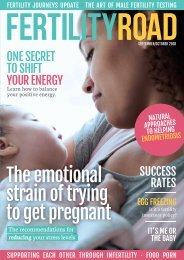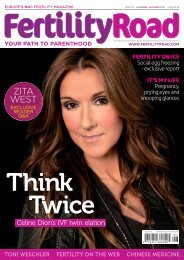Fertility Road Issue 44 May/June 2018
Fertility Road Magazine
Fertility Road Magazine
You also want an ePaper? Increase the reach of your titles
YUMPU automatically turns print PDFs into web optimized ePapers that Google loves.
BODY<br />
Over the past twenty years, fertility problems<br />
have increased dramatically. At least 25<br />
percent of couples planning a baby will have<br />
trouble conceiving, and more and more couples<br />
are turning to fertility treatments to help<br />
them have a family. On average, young couples<br />
can expect to wait an average of three years<br />
before conceiving, and, as a result, very few<br />
doctors will consider a diagnosis of infertility<br />
until after at least a year has passed. With<br />
a growing number of women waiting until<br />
their careers are established before they try to<br />
conceive, conception can be more difficult.<br />
Boosting fertility nutritionally<br />
Although it goes without saying that a healthy<br />
diet is crucial to a successful pregnancy and a<br />
healthy baby, many people are unaware of the fact<br />
that diet can help to correct hormone imbalances<br />
that may affect a couple’s ability to conceive. The<br />
following should be included:<br />
• Plenty of fruit and vegetables<br />
• Complex carbohydrates – wholegrains like brown<br />
rice, oats and wholemeal bread<br />
• Organic foods where possible<br />
• Oily foods such as fish, nuts, seeds and oils<br />
• Reduced intake of saturated fats from dairy products<br />
• Increased intake of fibre<br />
• Avoid additives, preservatives and chemicals,<br />
such as artificial sweeteners<br />
• Avoid sugar, both on its own and hidden in food<br />
Eating the right type of fats is particularly<br />
important for fertility. Just small increases<br />
in the consumption of trans fats can double<br />
the risk of anovulatory infertility. Also for<br />
problems with ovulation like PCOS, substituting<br />
just 5% of the calorie intake as vegetable protein<br />
rather than animal protein reduces the risk of<br />
not ovulating by 50%.<br />
Having four cups of coffee or any caffeinated<br />
drink a day makes it 26% less likely that a<br />
woman will conceive and drinking only 2 cups<br />
of coffee (200mg of caffeine) a day is associated<br />
with a 25% increased risk of miscarriage. And<br />
problems with sperm health are connected with<br />
increased coffee intake.<br />
Alcohol will also make it more difficult to get<br />
pregnant with only just three alcoholic drinks<br />
or more a week. The same is true for male<br />
fertility, as we know that alcohol can lower<br />
sperm counts and will also block the body’s<br />
ability to absorb fertility boosting nutrients like<br />
zinc. It can also cause abnormalities in the head<br />
of the sperm which is important for healthy<br />
fertilisation of the egg.<br />
Lifestyle recommendations<br />
A woman is twice as likely to get pregnant if she<br />
doesn’t smoke compared to a woman who does.<br />
And smoking is linked to 5,000 miscarriages<br />
per year.<br />
Stopping smoking is just as important for men.<br />
We know that chemicals in tobacco smoke<br />
can damage DNA in sperm which can make it<br />
harder to conceive because fertilisation can’t<br />
take place or if it is does, it can increase the risk<br />
of a miscarriage as nature will always work on<br />
survival of the fittest. Smoking can also affect<br />
the sperm count, motility and the morphology<br />
(the shape of the sperm, whereby it could have<br />
two heads or two tails if the morphology is<br />
abnormal). Smoking also has a negative effect<br />
on the head of the sperm making it harder<br />
to fertilise an egg. It is thought that nicotine<br />
overloads the receptors on sperm, affecting their<br />
ability to bind to the egg.<br />
Smoking also reduces the changes of an IVF<br />
treatment being successful. If couples smoke<br />
during the IVF cycle the number of eggs retrieved<br />
is decreased by 40 per cent and 46 per cent if just<br />
the man smokes during the cycle. Also, the overall<br />
success rate of the IVF was <strong>44</strong> per cent for nonsmokers<br />
and 24 per cent for smokers.<br />
Other simple lifestyle changes for the man can<br />
include avoiding hot baths and tight underpants as<br />
sperm production takes place at 32°C (89°F) which<br />
is lower than the body temperature at 37°C (98.4°F).<br />
The testes are on the outside of a man’s body to keep<br />
them cooler but the closer they get to the body e.g. by<br />
sitting for long periods when driving for example, can<br />
heat up the sperm and reduce the count.<br />
Men using laptops on their laps are also a problem<br />
for sperm health. In order to balance the laptop,<br />
men will often close their legs and this on its own<br />
(even without the laptop) raises the temperature<br />
of their genitals by up 2.1°C. But the laptop itself<br />
generates heat and the combination of closing the<br />
legs and the heat from the laptop causes a rise in<br />
temperature of up to 2.8°C. Just a rise of 1°C can<br />
decrease fertility by 40%.<br />
| fertilityroadmag | follow us @fertilityroad<br />
fertilityroad.com | 23

















